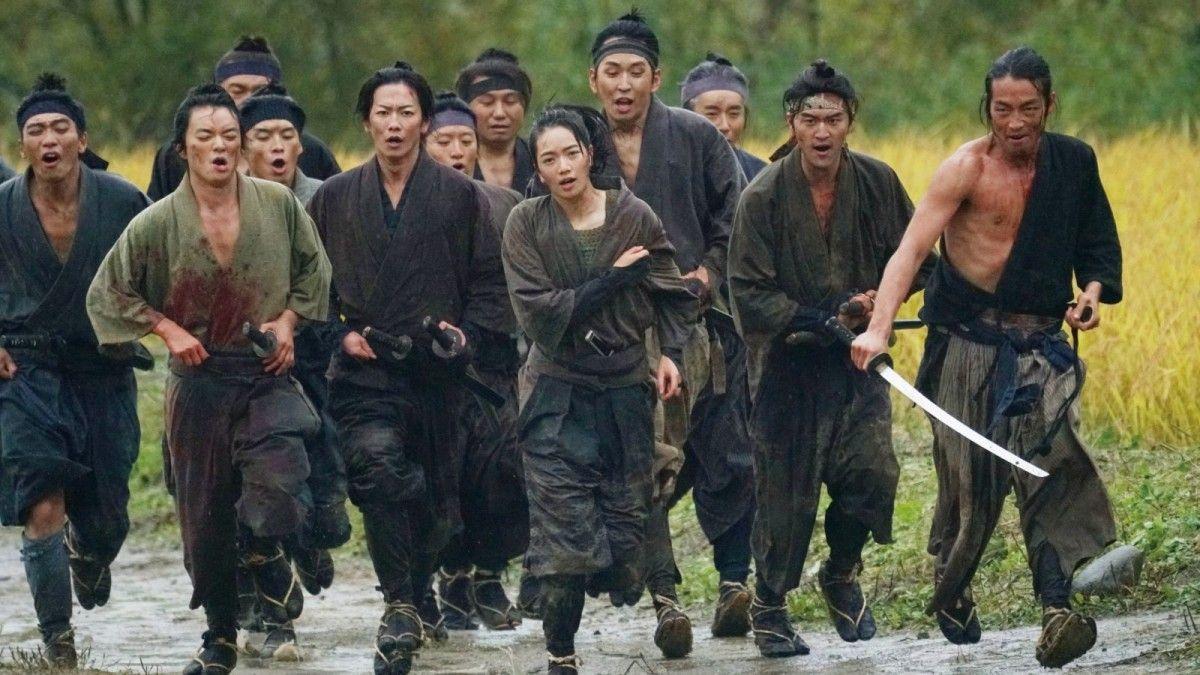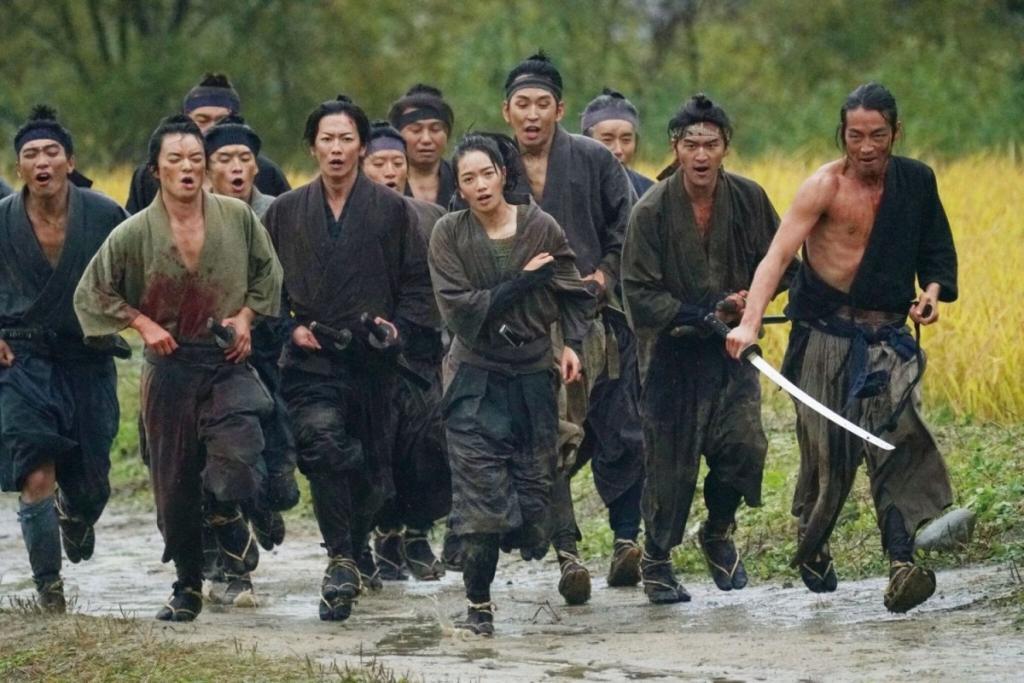
Times are-a-changin’ in director Bernard Rose’s jidaigeki debut, Samurai Marathon 1855, a 105-minute period epic based on Akihiro Dobashi’s 2014 novel with a story centered around Japan’s very first marathon.
A beachfront diplomatic meet-up beteeen U.S. navy officer Commodore Perry (Danny Huston) and the Shogun’s Chief Minister, Ioki Suketora (Etsushi Toyokawa) offsets Rose’s epic tale which introduces us to Annaka village Lord Itakura (Hiroki Hasegawa), and his rebellious daughter, Princess Yukihime (Nana Komatsu), a talented artist with whom, he’s betrothing to Tsujimura (Mirai Moriyama), another of his loyal samurai, to help sustain his bloodline.
We also meet a seemingly benign accountant bearing much more than meets the eye in Jinnai (Takeru Satoh), who happens to be secretly loyal to an underground clan of ninja, trained from boyhood and beholden to the shogun. Having long since been assigned to report on any anomalous activity from Annaka village, his mission finally takes effect one morning when Itakawa, after awakening one evening from the nightmarish omen of potential foreign conquest, announces a marathon to help restore discipline and reaffirm strength with a to-be-named prize to the winner upon victory.
Unfortunately, Jinnai has just one problem: Having pre-empted Itakura’s announcement initially believing it to be an act of rebellion instead of a harmless race, his letter to the Shogun well on its way before a new message can be sent. Making matters worse is Yuki’s sudden disappearance into the village population and entering herself into the race, forcing the two amid a growing number of others suddenly in a desperate fight to stay alive, and to save their village from a grave mistake.
Sprawling imagery of Japan’s green fields and forest paths encompass the film’s remainder of unraveling and violent twists following a first half of some pretty sizeable thickening and quirly character development. Our Shogun’s enforcer, Hayabusa (Ryu Kohata) lends the first sign of the film’s oddball close to a half-hour before he begins his violent crusade at the shogun’s will.
Actor Shota Sometani contributes his support as Hironoshi Uesugi, whose own moral quandry arises from his begrudged reputation among the racers as the village’s fastest runner. Young actor Ruka Wakabayashi goes hand-in-hand with veteran thesp and Samurai Gormet favorite, Naoto Takenaka, in the respective roles of the ambitious Isuke, and Mataemon Kurita, a retired samurai who used to serve Isuke’s father.
Nana Komatsu’s Yukihime is far from a damsel in distress despite being as stubborn as any princess with an understandable modicum of resilence – not too stubborn, however, when she needs help and knows it, and this comes at a key moment in the film when Hayabusa starts letting loose with a pair of pistols gifted to Suketora. Her fiancé, Tsujimura is as fallible as evrr despite his pretentious efforts at achieving alpha-male stature in front of his peers, though viewers will take a more of a liking to him as the film progresses.
The pistols bode pretty symbolic an anchor to Rose’s artful construction of a narrative illustrative of how the concept of peace is observed from two opposing sides. Moreover, what makes this deliberation interesting is its juxtaposition among allies with the West world serving as the proverbial lynchpin of this peculiar and harrowing discourse.
Scored by composer Phillip Glass and with a script co-written by Rose and with scribes Hiroshi Saito and Kikumi Yamagishi, there’s plenty to enjoy and take away from Samurai Marathon 1855. Cinematographer Takura Ishizaka reconvenes with his director of The Hurdy Gurdy Man in addition to our lead actor following the massively successful Rurouni Kenshin trilogy from Warner Bros. Japan whose Munetaka Aoki also rejoins the actor for brief role to add to the intrigue.
Watching the race itself unfold has its share of pretty revealing moments among our characters, specifically that of Jinnai who ultimately finds himself cornered into revealing his true self little by little over time with a bigger battle at hand. Fans who’ve followed his work on the Rurouni Kenshin trilogy should get a kick out of watching him in action again, including a brief appearance opposite Kenshin trilogy co-star Muneataka Aoki.
Several other characters competing in the race are visibly doing whatever it takes to win, at first, until they’re eventually betrayed and either accidentally killed off or murdered by either wild animals or assassins closing in on the 36-mile path from the village. One scene involves a betrayal that leads to a character hanging off a rope for dear life, followed a face full of bear poop, and that’s about as base as the comedy end goes.
Rose crafts a delightful period adventure in Samurai Marathon 1855, unearthing a rare tale for the first time with great characters – excellently performed and with a sufficient score by Glass to foundate the story. The action goes about 90% in terms of at least one key fight scene and some with a sharp eye will have a few notable nitpicks about the stacking (a fight choreography terminology employed when discussing the role cinematography plays in crafting an action sequence) but it doesn’t take much away from what the film accomplishes by the end.
Takenaka will undoubtedly stand out as one of the film’s bigger highlights for such a quirky character, while Rose himself bears the distinction of having cast an actress in Komatsu whose next accolade will be received in New York City. It’s a deserving highlight for the kind of wildly entertaining feat that is Samurai Marathon 1855, one that’ll have you cheering for the cast after the final lap.

